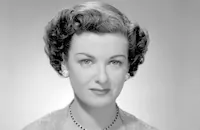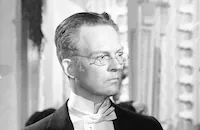Margin for Error
Brief Synopsis
Cast & Crew
Otto Preminger
Joan Bennett
Milton Berle
Otto Preminger
Charles Esmond
Howard Freeman
Film Details
Technical Specs

Synopsis
Despite his best efforts to avoid the assignment, police officer Moe Finkelstein is ordered by the mayor of New York City to guard the life of German Consul Karl Baumer. Moe turns in his badge when he realizes that he has been assigned to protect a Nazi, but the mayor refuses to accept his resignation. The mayor tells Moe that although he is opposed to Adolf Hitler's Nazi regime, he is under special orders from Berlin to halt demonstrations in New York against Nazi sympathizers and organizers. The mayor tells Moe that he has decided to abide by the wishes of the Berlin government in order to teach the Nazis the difference between the American system of democracy and their fascism. Soon after he arrives at the Consul's residence, Moe discovers that Baumer is in trouble with Berlin for having squandered money meant for sabotage. Meanwhile, Baumer's secretary, Baron Max von Alvenstor, has become disenchanted with Baumer and the Nazi cause and refuses to abide by Baumer's orders to stall the delivery to Berlin of a damaging financial report. Sophie, Baumer's Czechoslovakian-born wife, confesses to Moe that she despises her husband and that she married him only to get her father out of prison. Moe comes to truly hate Baumer, and unable to contain his anger one day, flies into a rage and insults the Consul. Moe's temper eventually subsides as he begins a romance with Frieda, the Consul's maid, whom he takes on a date to see the film Confessions of a Nazi Spy . Also at odds with Baumer is Otto Horst, the bumbling leader of the American bund, who is ordered by the Consul to procure false indentification cards for a group of German saboteurs being sent to blow up an American port. In order to protect himself from Berlin's harsh reprimands, Baumer tells Max that he has information that his ancestors are Jewish and that he will use it against him unless he stalls the financial report. Under orders from Berlin to dispense with Horst's services, Baumer arranges an elaborate scheme to frame Max for Horst's murder. Baumer then tries to enlist the help of his wife in the scheme, but she refuses and warns Horst of the plan. Horst decides to defend himself against the attack by carrying his gun to his next visit with the Consul. Meanwhile, the saboteurs have rigged a bomb to explode at an American port at the moment Hitler concludes his radio broadcast. While listening to the broadcast with Horst, Max and Dr. Jennings, Sophie, transfixed by the sight of Horst's gun, grabs it and shoots her husband. A loud noise in the radio broadcast coincides with the gunshot, and it takes a moment before Max notices that Baumer is dead. Max quickly whisks Sophie out of the room before anyone sees her and tells her to flee. When Moe discovers the body, he rounds up all the possible suspects, including Sophie, who readily confesses to killing her husband. To protect her, though, Max insists that he was the one who killed the Consul. All are dumbstruck when Moe reveals that Baumer was not only shot but stabbed as well. Furthermore, following Dr. Jennings' examination of the body, it is determined that Baumer was poisoned, too. Max, meanwhile, rushes to the ship where the saboteurs are hiding and orders them to dismantle the bomb before it detonates. With only minutes to spare, the bomb is dismantled and the saboteurs are captured. Back at the Consul's house, Max identifies Horst as an accomplice to the saboteurs, and Horst is arrested. Max is cleared of murder charges when the coroner's report reveals that Baumer died of poisoning by his own hand. The poison apparently was intended for Max, but the glasses got switched and Baumer accidentally took his own poison.

Director

Otto Preminger
Cast

Joan Bennett

Milton Berle

Otto Preminger

Charles Esmond

Howard Freeman
Poldy Dur

Clyde Fillmore
Ferike Boros
Joseph Kirk

Hans Von Twardowski
Ted North
Elmer Jack Semple
J. Norton Dunn
Hans Schumm
Edward Mcnamara
Selmer Jackson
Eddie Dunn
Barney Ruditsky

Don Dillaway
Dick French
Ruth Cherrington

Byron Foulger

Emmett Vogan
David Alison
Allan Nixon
Malcolm Mctaggart
Tom Seidel
John Wald
Gary Breckner
Louis Donath
Wolfgang Zilzer
Crew
Fred Allen
Lucien Andriot
Lewis Creber
Edward Cronjager
Richard Day
Ralph Dietrich
William Goetz
Eugene Grossman
Leigh Harline
Lillie Hayward
Percy Ikerd
Harry M. Leonard
Thomas Little
Louis Loeffler
Earl Luick
Emil Newman
Al Orenbach

Film Details
Technical Specs

Quotes
Trivia
Notes
The opening credits for the film read: "Twentieth Century-Fox presents Clare Boothe's Margin for Error." Otto Preminger directed and starred in the Broadway run of Boothe's play. According to a New York Times news item, Twentieth Century-Fox purchased the rights to the play for $25,000 in the spring of 1941. The article notes that the property was temporarily shelved because the studio felt that Boothe's "statement of the opposition between fascism and democracy had become self-evident to the point of banality." The article also states that the character of the bund leader (Nazi organizer) in the play was eliminated in the film, and that the scene depicting the rescue of a prisoner from a concentration camp was dropped. In reference to the concentration camp rescue scene, Preminger is reported to have said that the situation, as it existed in the story, was "implausible." Although a October 14, 1941 news item noted that director, producer and screenwriter Arch Oboler had worked on the script for ten weeks just prior to his departure from the studio, the extent of his contribution to the final film has not been determined. A September 1942 Hollywood Reporter news item noted that Arthur Kober was set for a writing assignment on the picture, but his contribution to the final film, if any, has not been determined.
Actor Charles Esmond was better known as Carl Esmond. Hollywood Reporter production charts and studio publicity materials list Lucien Andriot as the photographer, although Edward Cronjager is listed on the film. Actor Howard Freeman was loaned to Fox from M-G-M. While the film does not clearly identify the character of the New York City mayor as Fiorello La Guardia, the Variety review suggests that La Guardia was indeed the model for the story's unnamed mayor.
A biography of Preminger notes that Twentieth Century-Fox initially offered Preminger only a starring role in the film, and that when he responded to the offer with a request to direct the film, it was flatly denied. Preminger eventually struck a compromise with the studio, which allowed him to direct the film at no pay, and allowed the studio to release him as the director after a one-week trial period if his work was not satisfactory. According to modern sources, before shooting began on the film, Preminger hired writer Sam Fuller to do a last-minute re-write of the script.

Miscellaneous Notes
Released in United States 1943
Released in United States 1943











